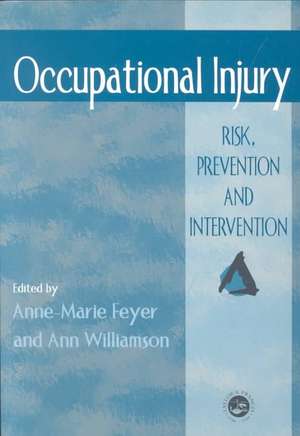Occupational Injury: Risk, Prevention And Intervention
Editat de Anne Marie Feyer, A Williamsonen Limba Engleză Paperback – 20 ian 1998
The book is divided into seven thematic parts with an introduction provided for each section. The topics include estimating the size of the problem, with discussions of different analytical techniques and their efficacy; the nature of causal agents the relative roles of risk, behaviour and organization processes; and the role played by compensation processes. Together the book brings into focus twenty chapters which address some of the issues of occupational injury and safety.
| Toate formatele și edițiile | Preț | Express |
|---|---|---|
| Paperback (1) | 671.75 lei 6-8 săpt. | |
| CRC Press – 20 ian 1998 | 671.75 lei 6-8 săpt. | |
| Hardback (1) | 676.52 lei 6-8 săpt. | |
| CRC Press – 20 ian 1998 | 676.52 lei 6-8 săpt. |
Preț: 671.75 lei
Preț vechi: 790.29 lei
-15% Nou
Puncte Express: 1008
Preț estimativ în valută:
128.56€ • 133.72$ • 106.13£
128.56€ • 133.72$ • 106.13£
Carte tipărită la comandă
Livrare economică 14-28 aprilie
Preluare comenzi: 021 569.72.76
Specificații
ISBN-13: 9780748406470
ISBN-10: 0748406476
Pagini: 294
Dimensiuni: 178 x 254 x 17 mm
Greutate: 0.5 kg
Ediția:1
Editura: CRC Press
Colecția CRC Press
ISBN-10: 0748406476
Pagini: 294
Dimensiuni: 178 x 254 x 17 mm
Greutate: 0.5 kg
Ediția:1
Editura: CRC Press
Colecția CRC Press
Public țintă
ProfessionalCuprins
Part 1 The data speak but what do they tell you? national occupational injury statistics - what can the data tell us? analysis of narrative text fields in occupational injury data; using data to identify industry research priorities. Part 2 Errors, mistakes and behaviour: the role of accident experiences on subsequent accident events; time-to-contact; the use of human error data as indicators of changes in work performance. Part 3 The role of risk in safety: is risk perception one of the dimensions of safety climate? the concept of target risk and its implications for accident prevention strategies; minimising the risk of occupational-acquired HIV/AIDS - universal precautions and health care workers. Part 4 Organizations, management, culture and safety: people make accidents, but organizations cause them; management and culture - the third age of safety; a review of approaches to organizational aspects of safety health and environment. Part 5 Safety interventions:workplace organizational factors and occupational accidents; safety interventions - international perspectives; before it is too late - evaluating the effectiveness of interventions; a three dimensional model relating intervention and co-operation to injury prevention - background, description and application. Part 6 Rules or trust - ensuring compliance: prevention of chemical injury - an unconventional view; the case for regulating compliance - a unionist's view; the case for industry self- regulation - introducing an alternative compliance system in the long distance road transport industry. Part 7 The compensation system in Australia - help or hindrance: workers' compensation and common law - how to civil legal system discourages occupational injury prevention; does compensation have a role in injury prevention?
Descriere
This book provides a diverse and multi-faceted look at some of the themes directing late-1990s research and intervention within the area of occupational injury and safety.
The book is divided into seven thematic parts with an introduction provided for each section. The topics include estimating the size of the problem, with discussions of different analytical techniques and their efficacy; the nature of causal agents the relative roles of risk, behaviour and organization processes; and the role played by compensation processes.
The book is divided into seven thematic parts with an introduction provided for each section. The topics include estimating the size of the problem, with discussions of different analytical techniques and their efficacy; the nature of causal agents the relative roles of risk, behaviour and organization processes; and the role played by compensation processes.








